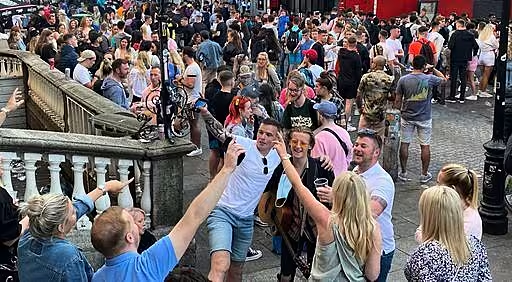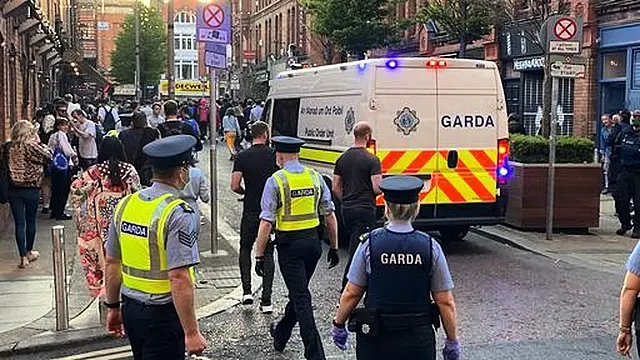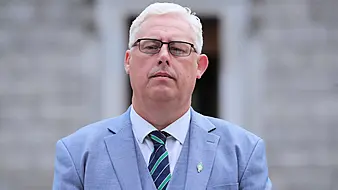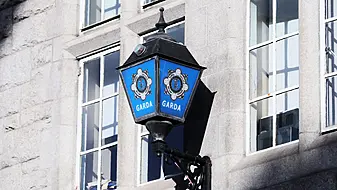While the Government has been pushing the message of an outdoor summer as Ireland reopens, recent issues have highlighted the lack of amenities available to support this vision.
Large gatherings in Dublin last weekend resulted in scenes of anti-social behaviour and widespread littering, while chief medical officer Dr Tony Holohan compared it to 'Jones Road on All-Ireland final day'.
However, others argued that the issue was a lack of facilities and public spaces.
Dublin City Council has since announced it will install 150 portaloo toilets, 54 large eurobins and 80 barrel bins across the city from this weekend with a specific focus on high footfall areas in the centre.
Questions will still remain over the 'outdoor summer' appeal and more controversy emerged this week when a popular bandstand in St Stephen's Green was fenced off from the public.
Green Party MEP Ciarán Cuffe feels the management of public spaces is an issue where Dublin City Council, and other local authorities across the country, must improve on.
“We need to better manage the spaces we already have,” Mr Cuffe told BreakingNews.ie. “I've been talking about this until I'm blue in the face, as a councillor I succeeded in putting aside €200,000 in Dublin City Council's budget to make this happen, and sometimes I just scratch my head and ask myself, why aren't we seeing the level of attention to public spaces that we need?”

He argued that dedicated positions for the management of public areas in cities and large towns would help to facilitate change.
“I think very simply nobody is in charge. The county manager or the chief executive delegates, and then it falls between different senior management staff. Traffic and environment do one thing, parks do another, the city architects or housing are doing something else again, that's why I'm saying we just need somebody with whom the buck stops.
“There are obviously issues over the powers and funding that councils have but even still they're kind of getting a C or D certainly when it comes to some of the recent scenes we've witnessed and there's no reason why they shouldn't be getting an A or a B.”
Mr Cuffe said councils and local authorities need to manage and monitor public areas as well as investing in amenities like public toilets, bins and seating areas.
'Culture problem'
“We have a cultural problem in some of our local authorities. 'Why would we put out more bins it would only attract more people?' I don't think that's the approach that they take here in Brussels, I don't think that's the approach they would take in Scandinavian countries.
“Of course it's not just about putting out more bins, it's about changing the culture so that people bring their rubbish home, so that pubs and takeaways don't just give you a whole pile of plastic to be left behind. There are wider issues about the throwaway economy, but it's not rocket science to get this right.
“The OPW for instance, sometimes they do things well and sometimes not so well, I live close to the Phoenix Park and when there's good weather forecast not only do they roll out more temporary bins, they put heavy duty plastic bags on the railings, and they know at the end of the day there will be three or four full ones. It's about management and maintenance.”
He reiterated his call for a position dedicated to overseeing the management of public spaces in cities and towns, adding “it has to start at the top”.
“It has to start with having someone whose job is to make sure our public spaces are managed well, this includes a rake of things from litter removal to making sure we don't have ugly electrical boxes taking up the street, you know the whole row about Luas engine traffic control boxes all around the place.
“Sometimes it's about having the right bin trucks for the job, here in Brussels they have a lovely little quiet electric vehicle that one worker operates with a big vacuum cleaner on it that can even clean under parked cars. There are new technologies that help, and there's also the person with the sweeping brush, too often we've pensioned off these people and brought in someone that can't get to a lot of the rubbish because the equipment isn't designed for it.”
A bit like the room where we watch the telly, somebody needs to do the cleaning and make sure people are well-behaved, and we need the same approach to outdoor spaces as we would take to our own living room at home.
He also feels gardaí can play a role in prevention of incidents like the scenes witnessed in Dublin.
“I'd like to think Owen Keegan [Dublin City Council chief executive] has learnt lessons from what happened in Dublin, but it's not just his job, the Garda Síochána need to be proactive on this as well.
“It's not just about serious incident policing it's about having a friendly face saying 'lads, a little bit of space here' or sniffing trouble in the air and dealing with it before it becomes a problem.
“It's not all sweetness and light here in Brussels, police sometimes use water cannons and send in police on horseback, and they have a bad reputation for sometimes getting it wrong but certainly here there are some good examples that we can learn from and be wary of not going over the top on some of the responses.
“We're realising the need to manage it better, maybe years ago there was a feeling that you could just go out to your garden when the sun was shining, but there are tens of thousands of people living in central Dublin who don't have a garden who are living in apartments, if they're lucky they have a balcony the size of a handkerchief, and if they're not, they don't even have that.
“The streets, and footpaths, and limited public squares are where they go, and I think we need to do better. Instead of fencing off public spaces we need to improve the maintenance.”
Public seating
He also feels additional public seating is “badly needed”.
“In Dún Laoghaire and Blackrock they have provided [public seating] but Henry Street and Grafton Street have no seating.
“For older people in particular, the ability to sit down and have a rest after walking a few hundred metres is a real godsend. I think the councils aren't putting in seating because they're saying 'oh, it will attract anti-social behaviour'. But if somebody is sleeping on a bench or having a row, there are bigger issues that we need to tackle, and we shouldn't just try to stop people who want to sit down and take a break.
“We've become better at providing public spaces, but it's about managing them not just providing them and a public square or street is a living room accessible to all. A bit like the room where we watch the telly, somebody needs to do the cleaning and make sure people are well-behaved, and we need the same approach to outdoor spaces as we would take to our own living room at home.”







